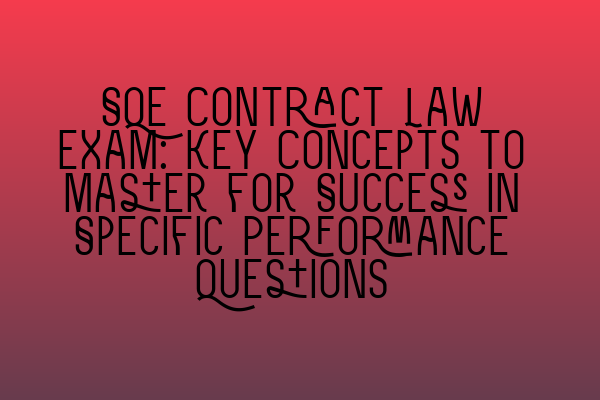SQE Contract Law Exam: Key Concepts to Master for Success in Specific Performance Questions
Are you preparing for the SQE Contract Law Exam? Do you want to maximize your chances of success by mastering the key concepts related to specific performance? Look no further! In this article, we will explore the essential topics you need to understand for specific performance questions on the exam.
Before we delve into the specifics, it’s important to have a solid understanding of what specific performance entails. In contract law, specific performance is a remedy sought by the innocent party when the breaching party fails to fulfill their obligations under a contract. It aims to compel the breaching party to perform their contractual duties as agreed upon.
1. Elements of Specific Performance
When tackling specific performance questions, it’s crucial to be familiar with the elements required to establish a valid claim for specific performance. These elements include:
- Valid and Enforceable Contract: Specific performance can only be sought if there is a valid and enforceable contract in place. You should be able to identify the essential elements of a contract, such as offer, acceptance, consideration, and intention to create legal relations.
- Breach of Contract: There must be a clear breach of contract by the other party. You should understand the different types of breaches, such as anticipatory breach, fundamental breach, and material breach, and be able to analyze their implications in specific scenarios.
- Unavailability of Adequate Legal Remedies: Specific performance is typically sought when monetary damages would not adequately compensate the innocent party. You should be aware of situations where specific performance is considered an appropriate remedy, such as in cases involving unique goods or real estate.
- Feasibility of Specific Performance: It’s essential to consider whether specific performance is feasible and practical in a given situation. Factors such as impossibility, impracticability, and specific performance’s impact on third parties need to be taken into account.
By grasping these essential elements, you will be better equipped to analyze and answer specific performance questions effectively.
2. Defenses Against Specific Performance
In addition to understanding the elements of specific performance, it’s crucial to be aware of the defenses that can be raised against a claim for specific performance. Common defenses include:
- Inadequate Consideration: If the contract lacks adequate consideration, specific performance may be denied. Make sure you are familiar with the rules surrounding consideration and the exceptions to the general rule.
- Mutuality of Obligations: Specific performance requires both parties to be bound by mutual obligations. If one party’s obligations are illusory or uncertain, specific performance may not be granted.
- Unclean Hands: If the innocent party has engaged in misconduct or unfair behavior during the course of the contract, a defense of unclean hands may be raised, potentially preventing specific performance.
- Impracticability: If the performance of the contract becomes impracticable or impossible due to unforeseen circumstances, specific performance may be denied.
Having a good understanding of these defenses will allow you to identify their applicability in specific scenarios and formulate well-rounded answers in your exam.
3. Relevant Case Law
Case law plays a significant role when discussing specific performance in contract law. Familiarizing yourself with landmark cases can enhance your understanding of the subject and help you draw parallels with hypothetical scenarios.
One notable case is Beswick v Beswick, where specific performance was granted in a family context. This case highlights the importance of privity of contract and the potential for third-party rights in specific performance claims.
Another notable case is Cooper v Phibbs, which examined the principle of mistake and its impact on specific performance. Understanding such cases will enable you to analyze and apply legal principles effectively in your exam answers.
4. Potential Essay Questions
Lastly, it’s essential to practice answering potential essay questions related to specific performance. This will not only improve your exam technique but also solidify your understanding of the key concepts.
Here are a few examples of potential essay questions:
- Discuss the essential elements required to establish a claim for specific performance.
- Analyze the defenses that can be raised against a claim for specific performance and their potential impact.
- Evaluate the feasibility of specific performance as a remedy in different scenarios, considering factors such as impossibility and impact on third parties.
Working through these essay questions will help you identify any gaps in your knowledge and provide an opportunity for further study.
Now that you have a clear roadmap to mastering specific performance concepts for the SQE Contract Law Exam, make sure to put in the necessary study and practice. By understanding the elements, defenses, case law, and potential essay questions, you can increase your chances of success in this critical area of contract law.
Discover more about the legal field:
- Exploring Solicitor Salaries in the UK: Average Earnings and Factors Affecting Income
- Securing Training Contracts: A Roadmap to Becoming a Solicitor
- Mentorship for Aspiring Solicitors: Nurturing Talent in the Legal Field
- Legal Challenges and Pitfalls: Navigating the Complexities of the Legal System
- The GDL (Graduate Diploma in Law): A Pathway to Becoming a Solicitor
